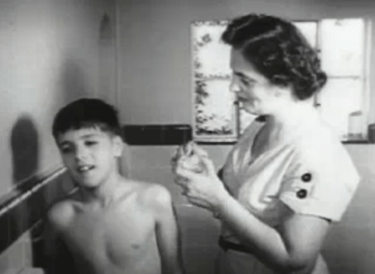Last week, this colorful video, intended for Japanese children, made the Internet rounds. It explains the problems at the reactor in Fukushima by way of an extensive metaphor: the reactor is a baby, called Nuclear Boy; he has stomach problems, and feels like he might poop. Everybody is worried for him, because “Nuclear Boy is notorious for his stinky poo. It would surely ruin everyone’s day if he pooped.” But “doctors” are working around the clock to get him his “medicine,” so the child watching should be reassured; NB “passed gas” a few times, resulting in some “smelly neighborhoods,” but “don’t worry, the odor won’t last long!”Andrew Revkin of the New York Times reported that the video was crowd-created, originally written by an artist, Hachiya Kazuhiko, who tried to explain the events at Fukushima to his family via Twitter; Kazuhiko’s tweets became the script for the video, animated by various anonymous sources.
The reaction to this video online was mostly one of bemusement and laughter—most, I think, provoked by the very thought of poop; some commenters were, implicitly or explicitly, shaking their heads: “Japanese culture is CRAZY!” It’s hard to get a handle on a video like this: is it, as Alice Bell floated on Twitter, patronizing, because kids should know how serious things are, and should be trusted to grasp science without relating it to poo? Is it just straight-up funny, allowing us to rest for a minute in the middle of bad news? How well will kids “get it” after watching this, and will they be reassured? Should kids always be reassured, no matter what the topic, or are things nuclear so serious that we should treat them with more gravity?
Watching this video, I was reminded strongly of an experience I had observing a classroom in which a group of undergraduates were shown the American film “Duck and Cover,” from 1951, sponsored by the U.S. Federal Civil Defense Administration and the Safety Commission of the National Education Association. In case you’ve never seen this gem, here it is:
In it, a reassuring male voiceover walks students through the basics of protection from atomic attack: duck under a piece of furniture, stay away from windows, cover the back of your head with your hands. The film’s animated turtle, Bert, serves as example for the kids, because when he sees danger he hides in his shell. The students watching the movie in the class I observed were incredulous; they laughed and laughed. But I noticed that the discussion afterwards went almost nowhere. They simply couldn’t take the video seriously, or believe that anybody ever had.
Like “Nuclear Boy,” “Duck and Cover” tried to reassure its young audience; instead of showing the effects of a nuclear blast on an actual house and landscape, it switched into animation for that explanation:

The bomb’s effects on the body were similar to those of a bad sunburn, one that might require submitting uncomfortably to your mother’s ministrations:

And although the bomb was “very dangerous,” it could be “gotten ready for,” “just as we are ready for other dangers that are around us all the time.” Fire and automobiles also contain danger, but can be controlled by alert firemen and policemen in double-breasted suits. “Duck and Cover” told you that the bomb could happen at any time—when you were away from your parents (terrifying), or when you were with your parents on a picnic (never let your guard down!); thankfully, since it was possible to survive by putting your head under a picnic blanket, your constant preparedness would be rewarded.

Both videos try to use “kid” vernacular to connect with audiences; “Nuclear Boy” reaches the height of frenzied silliness when trying to explain what happened at Chernobyl and Three Mile Island: at TMI, the incident resulted in “a lot of passed gas, but no poo”; in Chernobyl, Chernobyl Boy pooped “all over the classroom,” “and it was diarrhea.”

The diaper Nuclear Boy wears keeps the poo from flying all over the place, “but nobody knows how to get rid of a soiled diaper.” “Nuclear Boy” is honest about this disposal issue, and about the possible consequences of a major incident:

But there’s still a fundamental disconnect between the funny idea of nukes-as-poop and the actuality of consequences.
Meanwhile, it’s kids who suffer first when there’s an incident like this one; the water in Tokyo has been recently found to be too irradiated for small children to drink. See this interview for PRI’s The World with a mother who’s trying to figure out how to keep her kids safe. And the New Scientist reported on Thursday that the radioactive fallout near Fukushima was approaching Chernobyl levels.
